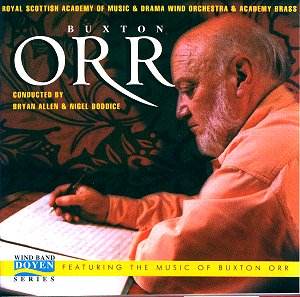AVAILABILITY
SPS, 1 Tiverton St, London SE1 6NT. Phone 020 7367 6570; fax:
020 7367 6589. dominique.willmore@sp-s.co.uk
Born in Glasgow, Buxton Orr graduated in medicine
and physiology before enrolling as a student at the Guildhall
School of Music and Drama in the early fifties, joining the composition
classes of Benjamin Frankel. It was no surprise that he had originally
chosen a career as a doctor given that his father and uncle had
both been in the medical profession before him. Oddly enough this
came about because Orr’s grandfather, who had been a well known
member of the Scottish Orchestra for many years, felt strongly
that his two sons should pursue a more "respectable"
career than music.
Like a number of other composers of his generation,
amongst them his teacher Frankel and Malcolm Arnold, Orr found
early success in the field of film music. He wrote scores for
a number of Boris Karloff horror movies, together with the successful
Suddenly Last Summer and numerous stage productions. Also
like a good number of his contemporaries, his music was to enter
a period of decline from which it was to struggle to recover.
Although Orr flirted with his own derivation of twelve-tone technique,
his music was never to make a full-scale departure into atonality.
As a consequence he was to be largely castigated amongst the critics
and musical powers-that-be of his day.
That his music has a firm foot in tonality is
clearly demonstrated by the works on this disc, as different in
character as they are. Tournament and Narration
are the two works heard in their original scoring, whilst the
Trombone Concerto was originally written with brass band
accompaniment as opposed to the later wind band version heard
here. A Caledonian Suite was again initially written for
full brass band, here given in its subsequent scoring for symphonic
brass.
Tournament is a quite literal musical
depiction of a jousting tournament, complete with resplendent
opening fanfares. These are followed by a dance for the full company
and the introduction of the ladies for whom the various competitors
will engage in combat. In the jousting event itself the music
becomes ever more elaborately ornamented, reaching a considerable
degree of sophistication. The music is highly colourful, imaginative
and skilfully scored in its instrumental characterisation. Despite
its overall spirit of gallantry it features a particularly poignant
central slow movement, My Lady Lulworth’s Lament. Royal
Scottish Academy Brass give a performance of aplomb equalled in
the less challenging, A Caledonian Suite. The Suite is
more commonly heard in its brass band version where its attractive
melodic spirit has made it a popular choice of contest test-piece
on a number of occasions. The work harks back to Orr’s Scottish
roots, being cast in four brief movements each of which carries
an unmistakeably Celtic flavour.
On a dramatic level the Trombone Concerto
and Narration carry the greater weight and are more ambitious
in conception. Narration started life as the principal
material for a projected opera based on a classic black comedy.
The composer was unwilling to reveal the identity of the comedy,
preferring listeners to find their own story and chief protagonists
in what amounts to a musical précis of the operatic plot
and characters. It is worth listening to the piece a couple of
times to allow the narrative element to come fully into focus.
The work is rarely without incident and the anonymous characterisations
in the music, often portrayed by particular instruments, for instance
a whinging saxophone [4:47], are often highly effective.
The Trombone Concerto is given a fine
performance by Ian Bousfield who, at the time the booklet notes
were written, was principal trombone with the London Symphony
Orchestra, since having taken over the principal chair at the
Vienna Philharmonic. Bousfield’s rich, warm sound is well suited
to the more lyrical passages in particular. This is appropriate
given that the overall mood of the work, whilst not without bravado,
is more contemplative than one could possibly expect of a concerto
for this instrument. The opening Andante con moto is a
case in point although the music passes through passages both
lighter and agitated as the movement progresses. The central Lento
is really a passacaglia, a haunting, slowly unfolding chordal
processional over which Orr weaves a beautifully expressive trombone
line of gradually increasing ornamentation. A central cadenza
is reached following which the final Alla Marcia commences
without a break, ultimately leading to a conclusion of exuberant
affirmation.
It is a shame that Doyen have not paid greater
attention to the booklet which reproduces the composer’s own notes
on Tournament and Narration but which completely
fails to give any information on the Trombone Concerto
or A Caledonian Suite. Without dates for the works it is
also difficult for the listener to put the pieces into any form
of chronological context. In this respect I would recommend taking
a look at Gary Higginson’s informative and useful biography
on Orr to be found in the Musicweb composer profile pages, the
biography also providing a comprehensive work list for the composer.
That said, with so little of Orr’s music having
been committed to disc we should be grateful to Doyen for treading
where few others (some light pieces including a transcription
of the Celtic Suite on ASV, Piano Trios on Marco Polo 8.223842
and John Gay Suite on Polyphonic QP RM 127 D)
have gone before. It is to be hoped that there is yet
another enterprising label out there willing to take up the challenge
of promoting a composer who deserves to be better represented.
Christopher Thomas
Buxton
Orr website

![]() Royal Scottish Academy
of Music and Drama Wind Orchestra and Academy Brass/Bryan Allen and Nigel
Boddice
Royal Scottish Academy
of Music and Drama Wind Orchestra and Academy Brass/Bryan Allen and Nigel
Boddice ![]() DOYEN DOYCD118 [68:58]
DOYEN DOYCD118 [68:58]